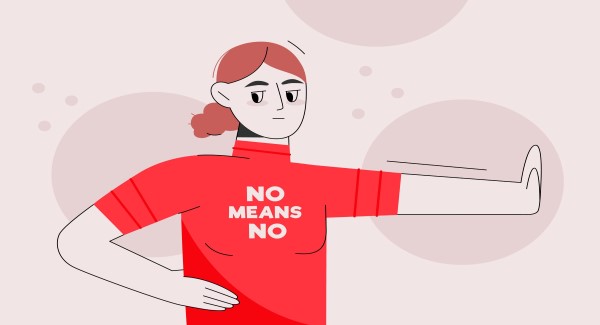
Some people go, “How can you say she was raped when she didn’t struggle? It means she enjoyed it.” This is a wrong notion and the right question to ask is: Can arousal occur during rape?
The answer is yes. According to research, of those who report their rape, around 5% also describe experiencing arousal/orgasm. This doesn’t mean they weren’t sexually assaulted. Also, rape does not always involve penile penetration.
Contrary to popular belief, rape is not always violent. Some survivors surrender to protect themselves or their loved ones while others are intoxicated, drugged, physically or mentally incapacitated, or in a situation where there’s an imbalance of power. In addition, some rapists are married to their victims. Some rapists are women. Some women rape men.
In all this, despite being the victim of an act that is always a violation, a rape survivor may experience increasingly intense physical sensations leading to climax – an orgasm.
In a 2004 review paper, a clinician reports:
“I (have) met quite a lot of victims (males) who had the full sexual response during sexual abuse… I (have) met several female victims of incest and rape who had lubrication and orgasm.”
How can a victim’s experience of rape include an orgasm?
If you have the time to go through Reddit threads or article comments on this topic (there are quite a number on the web), you’ll find story after story of people who feel ashamed of being aroused when they were sexually abused. Some people would argue that this means the victim enjoys the act so it means that there was a degree of conscious intention.
This is wrong. Rape and arousal can happen simultaneously, and one does not exclude the other.
To most people, an orgasm, at least in popular understanding, represents a peak of sexual pleasure, a state of euphoria. In that perception, if someone is experiencing rape, shouldn’t pleasure be absent? Shouldn’t the body, you know, shut that whole thing down? This isn’t true and this is why people really need a better understanding of human sexuality and human physiology.
Hundreds of years ago, some people also thought that rape couldn’t lead to pregnancy. So whenever someone who was raped got pregnant, it was taken as proof that the person wasn’t sexually assaulted. We don’t need to say how funny that line of thought is and the same applies in this case.
Despite what many rapists would like to believe, arousal does not mean that an assault was enjoyable or that a victim was asking for it.
Recommended Read: 7 reasons why women struggle with orgasms
So what does it mean?
Put simply, our bodies respond to external stimuli (including rape) and sometimes this happens without our permission. This could be to sex, fear, joy, pain, or anything else.
Our bodies sometimes respond without our intention so an orgasm during rape isn’t an expression of pleasure. It’s an example of a physical response that occurs whether the mind’s on board or not, just like breathing, sweating, or an adrenaline rush. The human body simply does not require our permission to do these things. Could you try not breathing? Give it a minute or two and the body’s will to survive will definitely have you gasping for breath.
Take tickling for instance. While it can be pleasurable, it can be a very unpleasant experience when done against someone’s wishes. However, during that unpleasant experience, the one being tickled will continue laughing even when they don’t like it.
Why? They just can’t help it.
How does this happen?
Our control over sexual arousal is no better than our control over the dilation of our pupils or how much we sweat. The presence of sexual arousal during rape is about as relevant to consent as any of these other responses.
In violent assaults, intense physical arousal from fear can heighten sexual sensations in a process called ‘excitation transfer.’ In one laboratory study, anxiety from the threat of electric shock enhanced male erectile responses to erotic images. Recent experiments also suggest that vaginal lubrication in women may be an adaptive response designed to reduce injury from penetration. The body is not enjoying itself – it is trying to protect itself.
According to Martin Lalumiere, a professor at the University of Ottawa’s School of Psychology, genital reactions during an assault are physical, reflexive responses – which are actually the body’s way of minimising injury, such as tearing and pain.
“Genital responses can occur in the presence of any sexual cue. In our research, we find that women – but not men – show responses even to sexual cues that they find very aversive, like descriptions of rape.”
What should change?
Unfortunately, rape survivors who experience arousal and rape report confusion and shame, no thanks to this conflict between the physical response of arousal and its usual association with enjoyment. Some wonder with shame if it was something they subconsciously wanted and society doesn’t help as well with the way victims get to be blamed for being sexually assaulted.
Again, it’s not their fault.
In conclusion, arousal during rape can happen but it is not a sign of guilt or pleasure.
It in no way indicates consent.
It is just a sign that our bodies react, just as they do with extreme heat or an adrenaline rush.
Only one person should be blamed – the rapist.
Consent is everything.




Right here is the right web site for anyone who hopes to understand this topic.
You know so much its almost hard to argue with you
(not that I personally would want to…HaHa). You definitely
put a fresh spin on a topic that’s been written about for years.
Great stuff, just wonderful!
I every time spent my half an hour to read this website’s content everyday along
with a mug of coffee.
You thank you for the information, I needed to know.